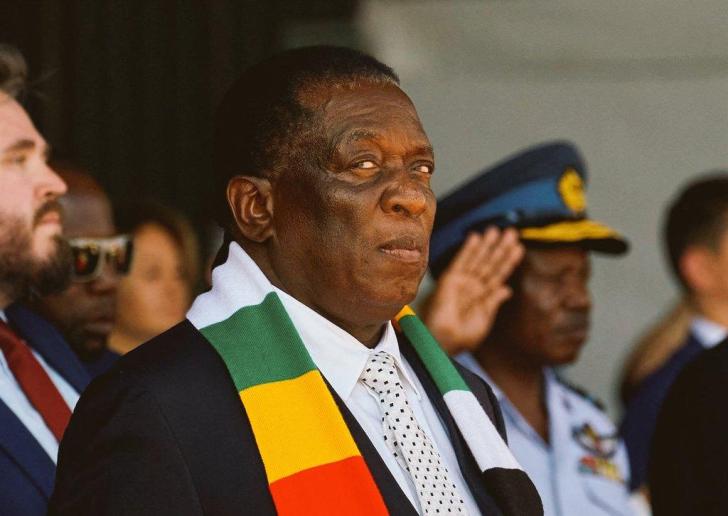News / National
Mnangagwa intensifying efforts to extend his presidential term limit
12 Jan 2025 at 12:29hrs |
0 Views

President Emmerson Mnangagwa is intensifying efforts to extend his presidency beyond the constitutional two-term limit, with a strategy aimed at postponing Zimbabwe’s next elections from 2028 to 2030. This move is part of a broader campaign to navigate around constitutional barriers that prevent him from seeking a third term.
Zanu PF, with backing from the main opposition party, Citizens Coalition for Change (CCC), has resolved to delay the elections, citing the need to complete developmental projects under Mnangagwa’s administration. CCC Chief Whip Charles Moyo confirmed the party's support, stating:
"As CCC, we are lobbying for the deferment of elections. We are proposing dialogue as the CCC together with the revolutionary party Zanu PF to allow smooth implementation of the National Development Strategy 2."
This development aligns with Zanu PF’s resolution during its 2023 annual conference in Bulawayo, which called for Mnangagwa to remain in office beyond 2028.
Despite public claims of disinterest in extending his rule, Mnangagwa has actively pursued mechanisms to remain in power. According to The NewsHawks, his initial plan for a third term proved impractical due to constitutional constraints. Zimbabwe’s Constitution limits presidents to two terms, and removing these limits requires a referendum. To allow Mnangagwa to benefit from any change, a second referendum would be necessary - a formidable legal and political hurdle.
Vice President Constantino Chiwenga and his military-aligned faction within Zanu PF reportedly oppose Mnangagwa’s plan. However, they are seen as too politically weak or cautious to openly challenge him. This internal division highlights the fragility of Zanu PF’s unity on the issue.
Patrick Chinamasa, Zanu PF’s legal affairs secretary, acknowledged that holding two referenda to extend Mnangagwa’s tenure is a difficult proposition. Despite these obstacles, Mnangagwa’s allies remain steadfast, with public calls for him to stay in power gaining momentum.
The push for delayed elections and extended rule follows a pattern seen among some liberation movements in the region. Similar strategies have been employed to maintain political dominance, raising questions about democratic consolidation in Southern Africa.
Critics argue that postponing elections undermines Zimbabwe’s democratic processes and sets a dangerous precedent. Opposition voices within and outside Zanu PF caution against prioritizing political maneuvering over constitutionalism and accountability.
As Mnangagwa’s 2030 plan unfolds, attention will focus on whether the proposed election delay gains formal approval and how the public responds to these developments. With two referenda required to amend the Constitution and a divided Zanu PF, the road to extending Mnangagwa’s rule is fraught with uncertainty.
The situation underscores the growing tension between constitutional principles and political ambitions in Zimbabwe’s governance landscape.
Zanu PF, with backing from the main opposition party, Citizens Coalition for Change (CCC), has resolved to delay the elections, citing the need to complete developmental projects under Mnangagwa’s administration. CCC Chief Whip Charles Moyo confirmed the party's support, stating:
"As CCC, we are lobbying for the deferment of elections. We are proposing dialogue as the CCC together with the revolutionary party Zanu PF to allow smooth implementation of the National Development Strategy 2."
This development aligns with Zanu PF’s resolution during its 2023 annual conference in Bulawayo, which called for Mnangagwa to remain in office beyond 2028.
Despite public claims of disinterest in extending his rule, Mnangagwa has actively pursued mechanisms to remain in power. According to The NewsHawks, his initial plan for a third term proved impractical due to constitutional constraints. Zimbabwe’s Constitution limits presidents to two terms, and removing these limits requires a referendum. To allow Mnangagwa to benefit from any change, a second referendum would be necessary - a formidable legal and political hurdle.
Vice President Constantino Chiwenga and his military-aligned faction within Zanu PF reportedly oppose Mnangagwa’s plan. However, they are seen as too politically weak or cautious to openly challenge him. This internal division highlights the fragility of Zanu PF’s unity on the issue.
Patrick Chinamasa, Zanu PF’s legal affairs secretary, acknowledged that holding two referenda to extend Mnangagwa’s tenure is a difficult proposition. Despite these obstacles, Mnangagwa’s allies remain steadfast, with public calls for him to stay in power gaining momentum.
The push for delayed elections and extended rule follows a pattern seen among some liberation movements in the region. Similar strategies have been employed to maintain political dominance, raising questions about democratic consolidation in Southern Africa.
Critics argue that postponing elections undermines Zimbabwe’s democratic processes and sets a dangerous precedent. Opposition voices within and outside Zanu PF caution against prioritizing political maneuvering over constitutionalism and accountability.
As Mnangagwa’s 2030 plan unfolds, attention will focus on whether the proposed election delay gains formal approval and how the public responds to these developments. With two referenda required to amend the Constitution and a divided Zanu PF, the road to extending Mnangagwa’s rule is fraught with uncertainty.
The situation underscores the growing tension between constitutional principles and political ambitions in Zimbabwe’s governance landscape.
Source - online
Join the discussion
Loading comments…


































